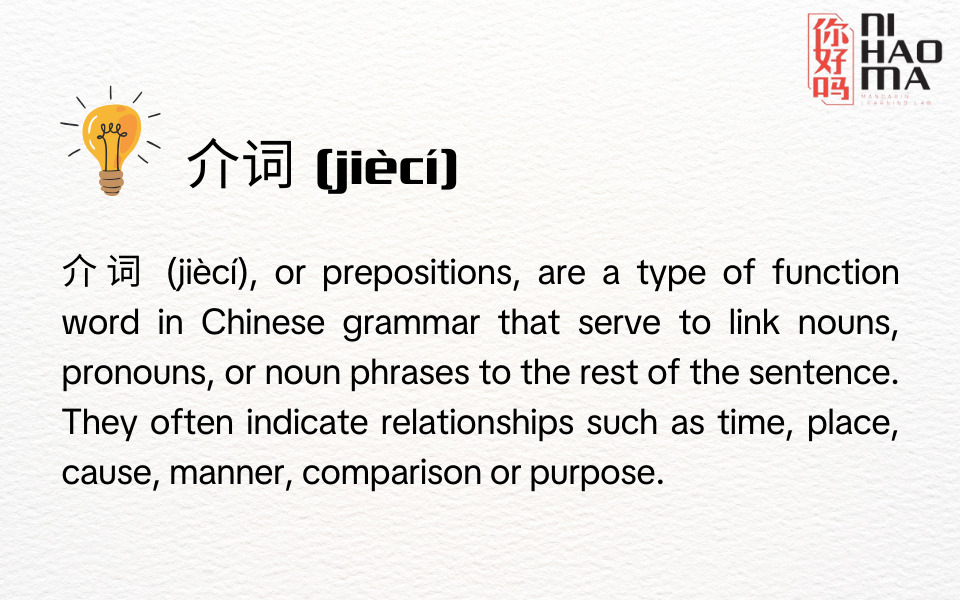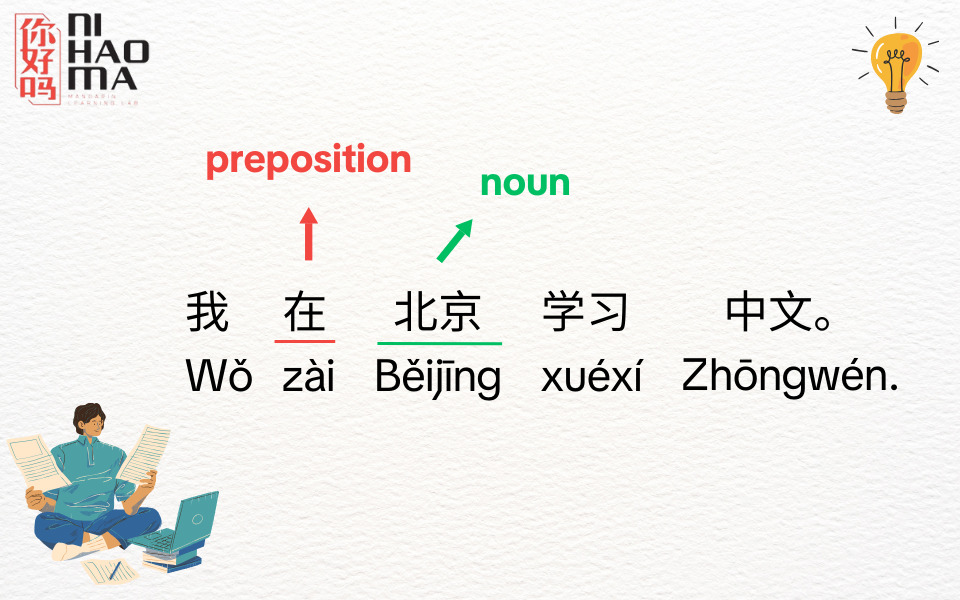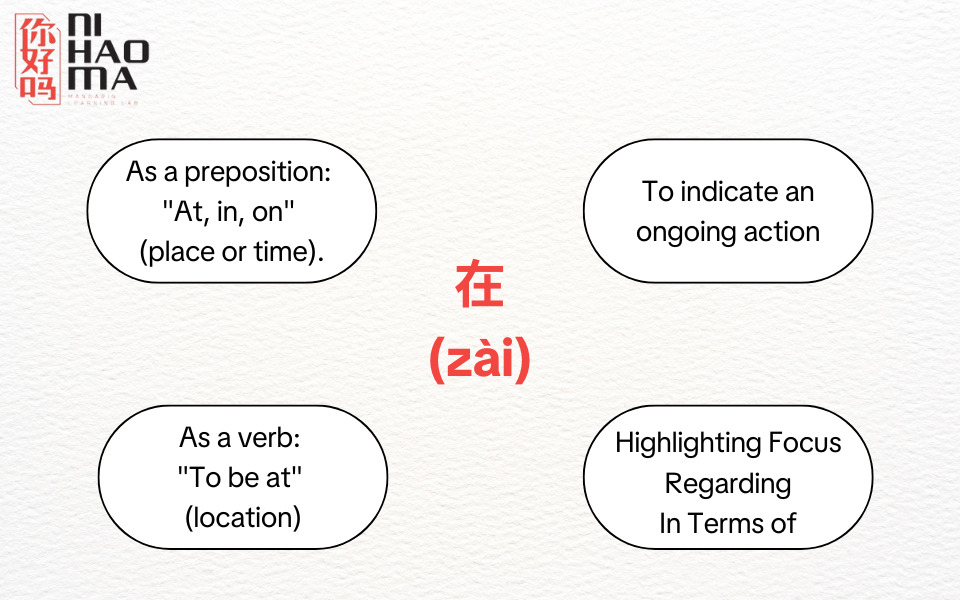Have you ever felt confused when encountering words like 在 (zài), 对 (duì), or 跟 (gēn) in Chinese? These are common prepositions, but they can be easily misunderstood if you’re not clear on how to use them. To help you feel more confident in using Chinese, this article from Ni Hao Ma will introduce some Chinese prepositions and how to use them.
What are Chinese Prepositions?
In Chinese, prepositions (介词 – jiècí) are a type of word used to link elements within a sentence, showing relationships such as time, location, manner, object, or cause.

Chinese prepositions do not stand alone; they are often paired with a noun or noun phrase to form a prepositional phrase (介词短语 – jiècí duǎnyǔ), which adds meaning and supports other elements in the sentence. For example:
他在学校学习。
(Tā zài xuéxiào xuéxí.) → He studies at school.
这件事情对我来说很重要。
(Zhè jiàn shìqíng duì wǒ lái shuō hěn zhòngyào.) → This matter is very important to me.
Common Chinese Prepositions
To use prepositions effectively, learners need to understand the different types and specific functions of Chinese prepositions. So, how are prepositions categorized in Chinese?
1. Chinese Prepositions Indicating Time
In Chinese, prepositions indicating time are commonly used to specify the time or period during which an action or event takes place. These prepositions help provide temporal meaning to the sentence, clarifying when something occurs.
Common prepositions related to time in Chinese include:
| Preposition | Meaning | Example |
|---|---|---|
| 在 (zài) | At, on, in | 他在早上七点起床。 (Tā zài zǎoshàng qī diǎn qǐchuáng.) → He wakes up at 7 a.m. |
| 从 (cóng)/自/从 (cóngzì) | Since, from | 我从八点开始工作。 (Wǒ cóng bā diǎn kāishǐ gōngzuò.) → I start working from 8 a.m. |
| 自从 | Since (from a point in time) | 自从我搬到这个城市,我就喜欢上了这里。 (Zìcóng wǒ bān dào zhège chéngshì, wǒ jiù xǐhuān shàngle zhèlǐ.) → Since I moved to this city, I have come to love it. |
| 到 (dào) | To, until | 我从八点到五点都在工作。 (Wǒ cóng bā diǎn dào wǔ diǎn dōu zài gōngzuò.) → I work from 8 a.m. to 5 p.m. |
| 以后 (yǐhòu) | After, later | 吃饭以后,他去散步。 (Chīfàn yǐhòu, tā qù sànbù.) → After eating, he went for a walk. |
| 之前 (zhīqián) | Before, prior | 下班之前,我要完成报告。 (Xiàbān zhīqián, wǒ yào wánchéng bàogào.) → Before finishing work, I need to complete the report. |
| 于 (yú) | At, in (used more in formal writing) | 他于2023年毕业。 (Tā yú 2023 nián bìyè.) → He graduated in 2023. |
| 至 (zhì) | Until, to (used more in formal writing) | 会议将于明天上午九点至十一点举行。 (Huìyì jiāng yú míngtiān shàngwǔ jiǔ diǎn zhì shíyī diǎn jǔxíng.) → The meeting will take place from 9 a.m. to 11 a.m. tomorrow. |
| 当 (dāng) | When, at the time of | 当我听到这个消息时,我非常惊讶。 (Dāng wǒ tīng dào zhège xiāo xí shí, wǒ fēicháng jīngyà.) → When I heard this news, I was very surprised. |
| 期间 (qījiān) | During, in the period of | 在暑假期间,我去了很多地方。 (Zài shǔjià qíjiān, wǒ qùle hěnduō dìfāng.) → During the summer vacation, I visited many places. |
2. Chinese Prepositions Indicating location and direction
Prepositions indicating location and direction in Chinese help define a place, a direction of movement, or the spatial relationship between objects. These prepositions are quite diverse and are frequently used in everyday conversation.
Here are some common Chinese prepositions indicating location and direction along with their meanings and examples:
| Preposition | Meaning | Example |
|---|---|---|
| 在 (zài) | At, in, on | 书在桌子上。 (Shū zài zhuōzi shàng.) → The book is on the table. |
| 从 (cóng) | From, starting from | 我从北京到上海。 (Wǒ cóng Běijīng dào Shànghǎi.) → I traveled from Beijing to Shanghai. |
| 到 (dào) | To, until, arrive at | 我们已经到北京了。 (Wǒmen yǐjīng dào Běijīng le.) → We have already arrived in Beijing. |
| 向 (xiàng) | Toward, facing | 他向我走来。 (Tā xiàng wǒ zǒu lái.) → He is walking toward me. |
| 往 (wǎng) | Toward, in the direction of | 他往东走。 (Tā wǎng dōng zǒu.) → He is walking east. |
| 离 (lí) | Away from, distance from | 我家离学校很近。 (Wǒ jiā lí xuéxiào hěn jìn.) → My house is very close to the school. |
| 朝 (cháo) | Facing, toward | 他朝窗外看。 (Tā cháo chuāngwài kàn.) → He is looking out the window. |
| 沿 (yán) | Along, following | 我们沿着河边散步。 (Wǒmen yán zhe hébiān sànbù.) → We are walking along the riverbank. |

3. Chinese Prepositions Indicating the Object
Chinese prepositions indicating the object are used to express the relationship between an action or state and its object. These prepositions clarify who or what is the target or object of an action.
Here are some common Chinese prepositions indicating the object along with their meanings and examples:
| Preposition | Meaning | Example |
|---|---|---|
| 给 (gěi) | To give, for | 他给我一本书。 (Tā gěi wǒ yī běn shū.) → He gave me a book. |
| 对 (duì) | Toward, regarding | 她对学习很认真。 (Tā duì xuéxí hěn rènzhēn.) → She is very serious about studying. |
| 关于 (guānyú) | About, regarding | 我们讨论了关于环保的问题。 (Wǒmen tǎolùn le guānyú huánbǎo de wèntí.) → We discussed the environmental protection issues. |
| 跟 (gēn) | With, along with | 我跟朋友一起去看电影。 (Wǒ gēn péngyǒu yīqǐ qù kàn diànyǐng.) → I went to watch a movie with my friend. |
| 和 (hé) | And, with | 他和老师讨论了这个问题。 (Tā hé lǎoshī tǎolùn le zhège wèntí.) → He discussed this issue with the teacher. |
| 为 (wèi) | For, on behalf of | 我为你准备了一份礼物。 (Wǒ wèi nǐ zhǔnbèi le yī fèn lǐwù.) → I have prepared a gift for you. |
| 至于 (zhìyú) | As for, regarding | 我们先讨论这个问题,至于其他问题,之后再说。 (Wǒmen xiān tǎolùn zhège wèntí, zhìyú qítā wèntí, zhīhòu zài shuō.) → Let’s first discuss this issue, as for the other issues, we will talk later. |
| 替 (tì) | On behalf of, instead of | 他替我向老师请假。 (Tā tì wǒ xiàng lǎoshī qǐngjià.) → He asked the teacher for leave on my behalf. |
| 被 (bèi) | By (passive voice) | 我的手机被偷了。 (Wǒ de shǒujī bèi tōu le.) → My phone was stolen. |
4. Chinese Prepositions Indicating the Method
In Chinese, prepositions indicating the method (how an action is performed or the means used to carry out an action) are important for expressing the way in which something is done. These prepositions help define the method or tool used in the process of performing an action.
Here are some common Chinese prepositions indicating method with their meanings and examples:
| Preposition | Meaning | Example |
|---|---|---|
| 用 (yòng) | Use, with, by | 他用手机拍照。 (Tā yòng shǒujī pāizhào.) → He takes photos with his phone. |
| 通过 (tōngguò) | Through, by means of | 我们通过网络学习中文。 (Wǒmen tōngguò wǎngluò xuéxí zhōngwén.) → We learn Chinese through the internet. |
| 按照 (ànzhào) | According to, in accordance with | 我们按照老师的建议去做。 (Wǒmen ànzhào lǎoshī de jiànyì qù zuò.) → We do it according to the teacher’s advice. |
| 以 (yǐ) | By, with | 我们以电话联系。 (Wǒmen yǐ diànhuà liánxì.) → We contact by phone. |
| 凭借 (píngjiè) | By virtue of, with the help of | 他凭借自己的努力考上了大学。 (Tā píngjiè zìjǐ de nǔlì kǎoshàng le dàxué.) → He got into university by virtue of his own efforts. |
| 靠 (kào) | Rely on, based on | 我们靠朋友的帮助才解决了问题。 (Wǒmen kào péngyǒu de bāngzhù cái jiějué le wèntí.) → We solved the problem relying on the help of our friends. |
5. Chinese Prepositions Indicating Cause and Purpose
Chinese prepositions indicating cause and purpose are used to explain the reason or goal behind an action or event. These prepositions are crucial when expressing why an action is carried out or the objective of that action.
Here are some common Chinese prepositions indicating cause and purpose, along with their meanings and examples:
| Preposition | Meaning | Example |
|---|---|---|
| 因为 (yīnwèi) | Because, due to | 因为天气很冷,所以我没去学校。 (Yīnwèi tiānqì hěn lěng, suǒyǐ wǒ méi qù xuéxiào.) → Because the weather was very cold, I didn’t go to school. |
| 由于 (yóuyú) | Due to, because of | 由于天气恶劣,我们取消了旅行。 (Yóuyú tiānqì èliè, wǒmen qǔxiāo le lǚxíng.) → Due to the bad weather, we canceled the trip. |
| 为了 (wèile) | In order to, for the sake of | 她为了减肥,每天跑步。 (Tā wèi le jiǎn féi, měitiān pǎobù.) → She runs every day to lose weight. |

6. Chinese Prepositions Indicating Comparison
Prepositions indicating comparison in Chinese are used to express the relationship between two objects, events, or actions in a sentence, emphasizing their similarities or differences. These prepositions help in drawing comparisons between things, making the relationships clearer.
Here are some common Chinese prepositions indicating comparison, along with their meanings and examples:
| Preposition | Meaning | Example |
|---|---|---|
| 比 (bǐ) | More, compared to | 他比我高。 (Tā bǐ wǒ gāo.) → He is taller than me. |
| 和 (hé) / 与 (yǔ) | And, with, together | 他与我有相同的兴趣。 (Tā yǔ wǒ yǒu xiāngtóng de xìngqù.) → He shares the same interests with me. |
| 如 (rú) | Like, as | 他如老师一样聪明。 (Tā rú lǎoshī yīyàng cōngmíng.) → He is as smart as the teacher. |
| 像 (xiàng) | Like, similar to | 她像我一样喜欢看电影。 (Tā xiàng wǒ yīyàng xǐhuān kàn diànyǐng.) → She, like me, enjoys watching movies. |
| 比较 (bǐjiào) | Relatively, quite | 他的中文比较流利。 (Tā de zhōngwén bǐjiào liúlì.) → His Chinese is relatively fluent. |
7. Chinese Prepositions Indicating Possession
In Chinese, possession is not usually indicated by a preposition like in some other languages. Instead, the particle 的 (de) is used to link nouns, expressing the idea of ownership or relationship.
For example:
| Preposition | Meaning | Example |
|---|---|---|
| 的 (de) | Of, possessive | 这是我的书。 (Zhè shì wǒ de shū.) → This is my book. 他的手机很贵。 (Tā de shǒujī hěn guì.) → His phone is very expensive. |
8. Chinese Prepositions Indicating Exclusion
Prepositions indicating exclusion in Chinese are used to express the idea of “except,” “unless,” or “besides.” These prepositions are used to exclude something or someone from a particular set or range.
Here are some common Chinese prepositions indicating exclusion, along with their meanings and examples:
| Preposition | Meaning | Example |
|---|---|---|
| 除了 (chúle) | Except, besides | 除了苹果,我还喜欢吃香蕉。 (Chúle píngguǒ, wǒ hái xǐhuān chī xiāngjiāo.) → Besides apples, I also like bananas. |
| 除非 (chúfēi) | Unless | 除非你同意,否则我不会去。 (Chúfēi nǐ tóngyì, fǒuzé wǒ bù huì qù.) → I won’t go unless you agree. |
| 以外 (yǐwài) | Besides, except for | 这个问题以外, 我们可以讨论别的事情。 (Zhège wèntí yǐwài, wǒmen kěyǐ tǎolùn bié de shìqíng.) → Besides this question, we can discuss other matters. |
How to Use Chinese Prepositions
Prepositions are words used to indicate the relationship between different elements in a sentence, typically between nouns or pronouns and other components such as verbs, adjectives, or complements. There are some rules for using prepositions in Chinese that you need to know:
1. Prepositions usually come before nouns, pronouns, or noun phrases
In Chinese, prepositions typically appear before nouns, pronouns, or noun phrases to form prepositional phrases. These prepositional phrases then serve as components of the sentence, usually acting as adverbials.
Example:
- 我在北京。
(Wǒ zài Běijīng.)
→ I am in Beijing. - 他对我很友好。
(Tā duì wǒ hěn yǒuhǎo.)
→ He is very friendly to me.
2. Prepositional phrases come before verbs
In general, prepositions in Chinese do not directly precede verbs. Instead, prepositions combine with nouns, pronouns, or noun phrases to form prepositional phrases, which then modify the verb.
Example 1:
- 我在北京学习中文。
(Wǒ zài Běijīng xuéxí Zhōngwén.)
→ I study Chinese in Beijing.
In this example, 在北京 (zài Běijīng) is a prepositional phrase that modifies the verb 学习 (study).

Example 2:
- 我从家里出发。
(Wǒ cóng jiālǐ chūfā.)
→ I depart from home.
The preposition 从 (cóng) comes before the noun 家里 (jiālǐ), not before the verb.
3. Prepositions can change meaning depending on the context
Some prepositions have multiple meanings, and understanding their meaning depends on the context in the sentence. For example, the preposition 在 (zài) can be used to indicate location and time, but it can also mean “doing” a certain action.
Examples:
- 我在家里。
(Wǒ zài jiālǐ.)
→ I am at home. - 我在学习中文。
(Wǒ zài xuéxí Zhōngwén.)
→ I am studying Chinese. - 我在上午学习。
(Wǒ zài shàngwǔ xuéxí.)
→ I study in the morning.

4. Prepositions should not be repeated
In a sentence structure, if a preposition has been used to indicate a specific relationship (such as time, location, method, etc.), repeating the same preposition without a clear grammatical reason can make the sentence unclear. However, different prepositions can be used in the same sentence.
Examples:
- 他从家里到学校去了。
(Tā cóng jiālǐ dào xuéxiào qù le.)
→ He went from home to school. - 他通过朋友给我发了一封信。
(Tā tōngguò péngyǒu gěi wǒ fā le yī fēng xìn.)
→ He sent me a letter through his friend.
You might want to read this:
- Mastering Chinese pronouns for Beginners
- 50+ Chinese measure words for Fluent communication
- Chinese interrogative pronouns and How to use them
Conclusion
Understanding and using Chinese prepositions correctly will make your sentences clearer and easier to understand. We hope this article from Ni Hao Ma has provided you with a comprehensive overview of prepositions in Chinese and how to use them effectively in daily communication.



